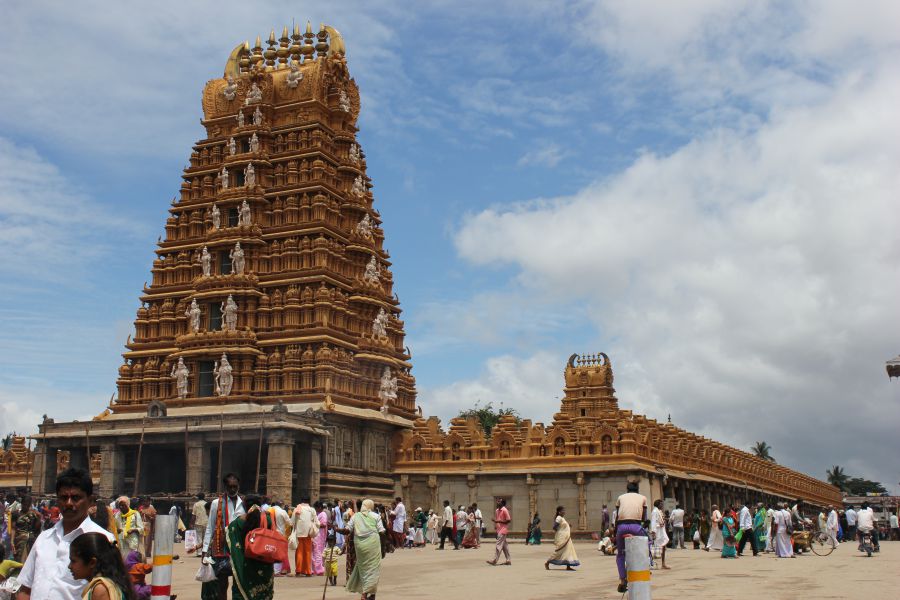Science and Scientific Reason behind Indian Tradition and Culture - PART - 6
It's part 6,
thank you for all the views and comments.
1. Why must the temple be the tallest
construction in the entire town?

An unsaid
rule from ancient times is that the temple should be the tallest
construction in that particular town or city. We see this rule in prevalence in
the Agraharam style of civilization in rural areas. I too noticed it when I visited
gamanagatti, there most of all the houses are smaller than the deity temple. The reason
is commonly stated is that “God is the Supreme, and hence the temple must be
the tallest.” The actual reason behind this practice is the absorbing power of
the temple gopuram. The gopuram is usually filled with paddy on the inside
which is an excellent absorbent of shock waves. Whenever lightning hits, the village,
the rays are diverted to gopuram and the excess harmful rays are transmitted to
the earth.
Beneficial cosmic
rays from the atmosphere are retained by the paddy and radiated inside the
temple.
2. What is the purpose of conducting
abhishekam?

There have
been debates regarding conducting abhishekams for the stone idols in temples. These
age-old granite idols tend to develop cracks in aging. Regular contact
with agents such as milk, honey, and oil help in keeping the idol intact, thus
preserving these ancient sculptures. Another interesting observation is that
the base on which these idols are mounted is made of a specific alloy of gold,
silver, and traces of lead, which have medicinal properties when combined with
milk and honey. This is why milk and panchaamrutam from the abhishekam that are
distributed, are said to have special properties that cure many diseases. Earlier,
when the literacy rate in the country was much less than it is now.
Instilling a
fear of God was the only way to put forth scientific ideas and practices
involving logical reasoning. We have unfortunately forgotten the essence of such
genius measures and brushed them away as superstitious.
3. Why we should not sweep after
sunset?
We are told
that if you sweep in the evening the goddess Laxmi or prosperity will be out
from the house and inviting poverty. But the actual reason for this is in
ancient times. When there was no electricity, the light of the lamp was not enough
creating chances for ornaments and precious items to be swept away. This was the
main reason why we should not sweep after sunset.
4. Why should we perform “Surya
Namaskaram”?

Surya
namaskar or Sun Salutation is a combination of 12 yoga poses. Regular practice
of Surya Namaskar helps women regulate irregular menstrual cycles and assist in
childbirth. Further, it helps in bringing a glow to the face and also prevents
wrinkles.
Each set of
Surya Namaskar has 12 asanas. So, when you repeat it 12 times from both sides, you
are doing 288 poses. What can be better than this when you can do 288 asanas in
just 20 minutes. Doing one round of Surya Namaskar burns approximately 13.90
calories.
5. Why do we draw Rangoli in front of houses?

The reason
a rangoli is drawn at the entrance of a house is because of its calming effects
on a visitor who is just about to enter the house. It manifests into vibrations
in the visitors’ minds, putting them at ease, making them comfortable and happy.
It also
said some one-time people would use rice flour or besan flour to draw
rangolis in front of the house. Rangolis were only made on special occasions. On
special occasions many cuisines and sweets. If they draw rangolis with rice
flour then insects like ants, mosquitos, and spiders would get attract to rangoli
and never enter the house to eat the cuisines and sweets.
Our
forefathers were more intelligent than the scientists of our generation!!
That’s it
for it today, let's call it a day and continue tomorrow.
Until then bye!!!!!!!!!!!!!!!!!

Comments
Post a Comment